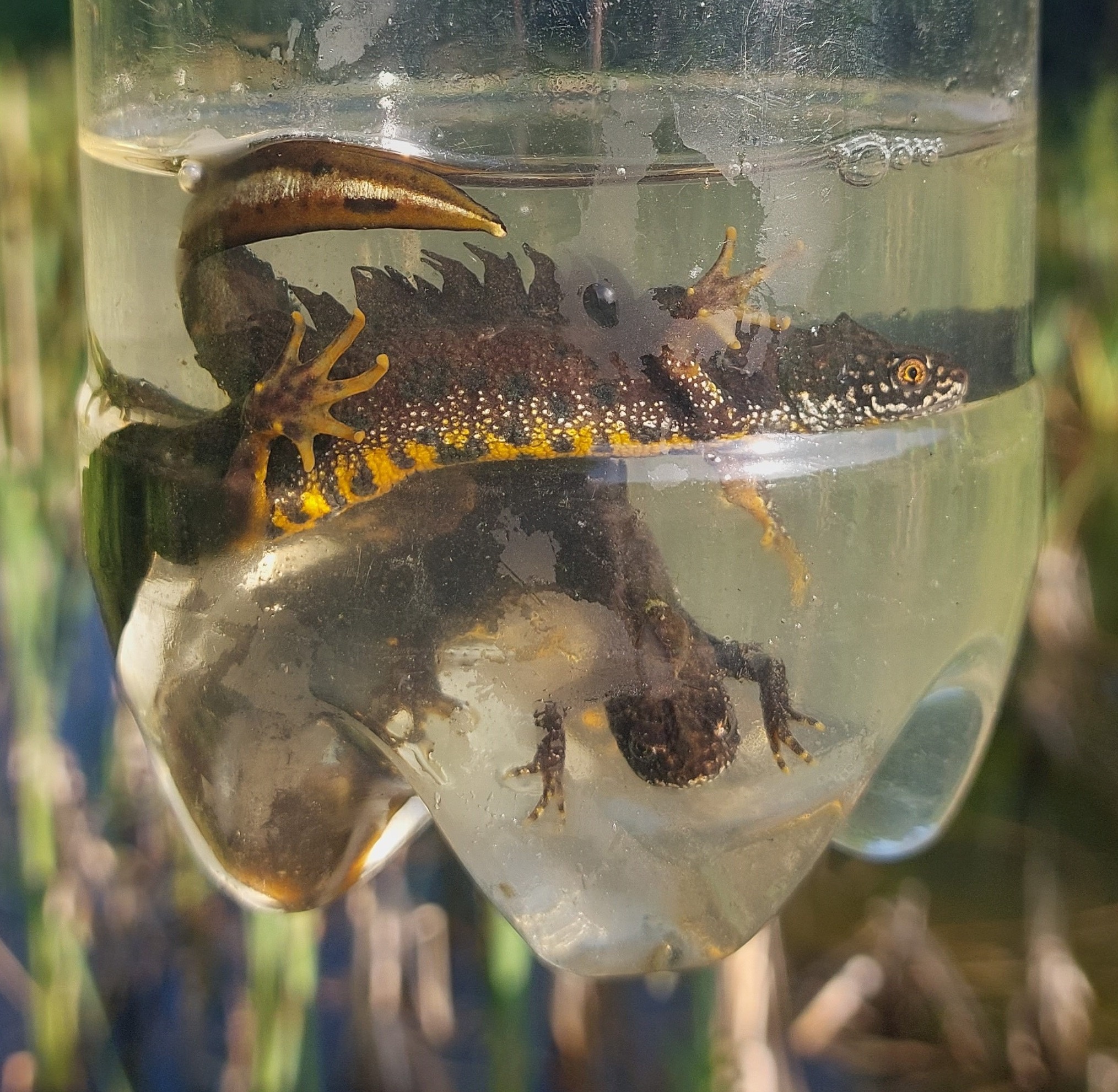When did you last see a newt? Have you ever seen one? Would you even want to? If you have a pond, you might just be lucky enough to have these amphibians quietly enjoying your garden alongside you. And unless you study your pond in spring, when they drop in to lay eggs, you might never see one. For a newt spends most of its time on land. As well as clean water in its mating pond, it needs some undisturbed ground to make a living. They like trees and woodland, hedges, long grass and unkempt corners. They enjoy a diet of invertebrates so depend on places where these critters thrive and course any newt will need a secret spot in which to spend the winter in hibernation.
Great crested newts caught in a bottle trap (under licence)
Image – Dave Willis (Newt Conservation Partnership)

In your garden pond you are most likely to find smooth newts. The great crested newt is the UK’s largest; the average length of an adult is 15cm. It is more often associated with farm ponds than those in gardens and that’s the main reason for its recent population decline. Farm ponds must have started to disappear when mains water made water troughs in fields a possibility – tidier and occupying far less space than a pond. The decline in the number of farm animals kept on farms in the East of England can only have made filling in field ponds that much more of an obvious choice.
Change is in the air at Wassledine. Our current environmental stewardship scheme will end in September and we are talking to various agencies about what might come next for the farm. The world of agri-environment schemes is changing post-Brexit and the government is still to finalise some of what has been discussed for environmental support. We are looking at more trees, more diverse and flowery grassland, more wilder bits and more wet bits; all to increase the land’s attraction for wildlife and further our business aims. And of course, hopefully the local human population will enjoy it all too.
We will tell you more as ideas become realities but it’s looking very much like we will this year, enter into an agreement with the Newt Conservation Partnership (NCP). No we had never heard of them either, but they sure are keen on! This charitable trust takes money from developers and is committed to creating high quality habitats for great crested newts with the proceeds. Their target is to create four new ponds for each one that is either destroyed or adversely affected by development. Dave Willis, NCP’s Bedfordshire officer is, to understate the case somewhat, a newt enthusiast; a self-confessed newt geek! He said: “Although our target is four ponds, we aim to create eight for each damaged by development. It’s an effective means of ensuring great crested newt survival, and provides habitat for many other species and we are gathering the data that shows it.”
Dave and the NCP have already dug two test pits on our land – thanks to the expert services of Gordon Redman and his digger . One in the corner of a field that’s a bit out of the way, but the other is in the base of what was until the 1960s a big, deep pond, near Carts Farm, off Campton Road. The pond started to decline when the main sewerage system was installed, perhaps this digging changed the course of underground water flow? If you happen to have any old photographs of this pond, we would love to see them. The test pit has been very successful – it’s overflowing today – and it looks like the NCP will fund the work which could include improvements to other bits of grassland. That’s all to be confirmed. If it does happen, it will be great news for great crested newts. And of course what’s good news for newts is good news for damselflies, dragonflies, diving beetles, water plants, water boatmen, swallows, moorhens… well you get the idea. And if it’s good for all of them, it’s sure to be good for those of us who will enjoy having more of these beasties around. Even if you can’t see them most of the time.
Watch this space.
The Newt Conservation Partnership is looking for more likely places on farmland in Bedfordshire to create new ponds or restore old ones. If your land may be of interest to them, contact Dave Willis on 07581 121270 or dwillis@freshwaterhabitats.org.uk
[picture – A great crested newt caught in a bottle trap under licence. Credit Dave Willis]
